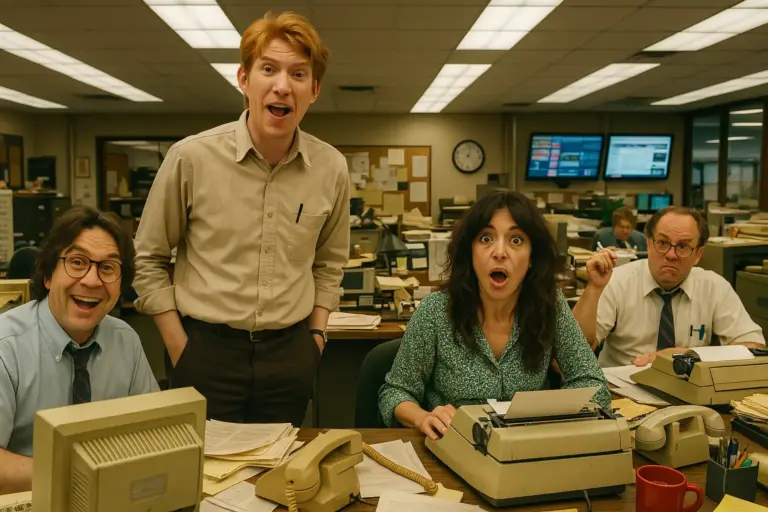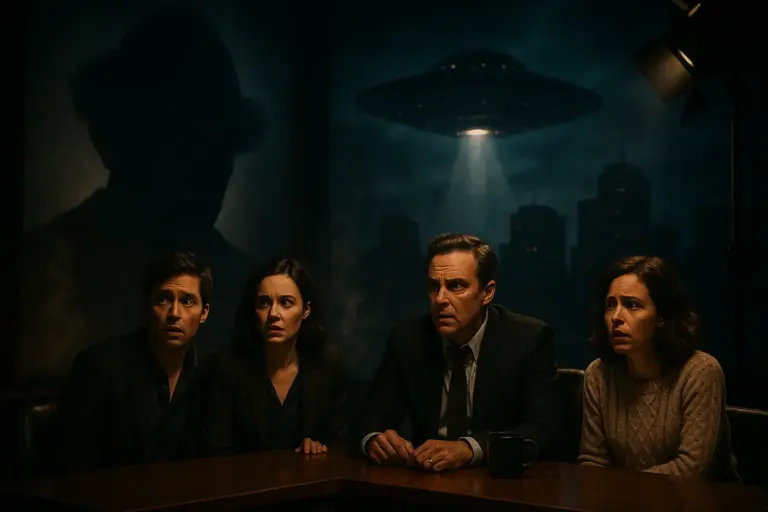Full Review With Positives, Negatives, and Critics’ Verdict
There’s a new show on Apple TV+ causing quite a stir – and it’s called “Government Cheese.” The show dropped on April 16, 2025, dazzling some and puzzling others. Set in Southern California in 1969, it tells the story of Hampton Chambers. Fresh out of prison, Hampton just wants to fix things with his family and get his unusual invention – the Bit Magician, a self-sharpening drill – off the ground. But does all this 1960s color and quirky ambition actually pay off? Or does “Government Cheese” make you wish for something… well, less cheesy and more gripping? Let’s dig deep, sort through buzzing critical reactions, and unravel whether or not “Government Cheese” is truly boring.
Behind the Curtain: The Show’s Promise
“Government Cheese” opens with a jolt of visual flair that quickly grabs your attention. David Oyelowo plays Hampton with an earnest, sometimes awkward intensity. From the very get-go, you sense this isn’t another cookie-cutter period drama. The show presents itself almost like a pop-art painting: every frame seems to pop with color, whimsy, and theatricality. The stylized approach even draws comparisons to legendary directors like Wes Anderson and the Coen brothers. The camera lingers on odd details. The dialogue flirts with surrealism. The mood? Unquestionably, it’s unique.
And yet, all this artsy ambition throws open a tricky question: is “Government Cheese” a captivating oddity, or does it drift so far from the center it loses the plot – literally?
Three Key Positives: What Works So Well
- Visual and Stylistic Dazzle: Right from episode one, reviews overwhelmed with praise for the show’s distinct aesthetic. The colors shine; the direction plays boldly with staging and design. Every scene pops like a frame from a retro comic book. It feels purposeful – deliberate, and fun to look at. Critics at the Financial Times compared its look to Wes Anderson and the Coen brothers. For some viewers, that’s enough to keep watching. If you value originality, this series gives your eyes a treat.
- David Oyelowo’s Performance: Many critics zeroed in on Oyelowo’s subtle genius. He’s a magnetic Hampton Chambers, somehow making the character’s outlandish dreams and clumsy sincerity plausible. Oyelowo avoids caricature. He navigates the tricky terrain between comedy and drama, grounding even the silliest moments with a wry, human touch. Several reviews call out his work as the cast’s anchor – a performance that brings life and texture to nearly every scene he’s in.
- Ambitious Storytelling and Creative Risks: Perhaps most exciting, the show doesn’t play by television’s usual rules. It takes risks – big risks. Surreal flourishes twist through the otherwise domestic drama. The period setting feels more like a wild experiment than typical nostalgia. The writers try to say something fresh about family, loss, hope, and the pursuit of dreams against the harsh American backdrop. For critics jaded by predictable storytelling, this boldness makes “Government Cheese” worth the ride.
Three Key Negatives: What Falls Flat
- Narrative Cohesion Lacking: And yet, the praise dries up quickly when it comes to structure. Multiple critics, including those at the Financial Times, point out that the story meanders. Plot threads unravel, stretch, and sometimes just disappear. Mood and style take the wheel, often at the expense of a clear, propulsive plot. You can get lost in the show’s visual flourishes, sure, but you might also get lost wondering what’s actually happening.
- Jarring, Inconsistent Tone: Critics at AwardsWatch and elsewhere argue that “Government Cheese” can’t pick a tone. One minute there’s an oddball comedic sequence, and the next there’s an earnest family drama or heavy-handed metaphor. This relentless gear-shifting creates awkwardness, especially in dialogue. Sometimes, it seems like the show isn’t sure if it’s a satire, a drama, or pure fantasy – so it tries to do it all. The result? Scenes that feel stilted or emotionally unearned, leaving viewers confused.
- Overcooked Metaphors and Forced Symbolism: One of the more consistent complaints: the show’s fondness for obvious, heavy-handed metaphors. As noted by MovieWeb, it spends a lot of effort constructing elaborate symbolic moments – sometimes to the point that the message feels ham-fisted. These metaphors draw attention to themselves, pulling you out of the experience. Subtlety often takes a back seat. The effect? Even when you want to care, the spotlight on symbolism can make the central narrative feel distant, staged rather than lived.
The Tension Between Style and Substance
Transitional moments in the show can feel like a highwire act. Sometimes, “Government Cheese” achieves a beautiful balance. A bit of surreal fantasy laces possibly mundane moments with magic, and you see both the real pain and the absurd hope driving Hampton and his family. But more often than not, this careful balance slips. The production prefers showing off, leaving the viewer to wonder what happened to the story’s beating heart.
Critics who love slick visuals and experimental TV may find themselves hooked by the show’s sheer nerve. Every frame wants to be a painting. Dialogue bounces between earnest and awkward. Even the supporting cast, drenched in retro costumes and caught in peculiar situations, seems designed to challenge your expectations about historical TV drama.
But for viewers and critics who crave a clear story, understandable stakes, and emotional immersion, the show drifts. The characters – despite all the invention – lose some of their humanity in this whirlwind of ideas. The style, while glorious, sometimes mutes the show’s intended impact.
Why It Divides Audiences
The reviews, which range from mild praise to deep confusion, highlight something essential: “Government Cheese” isn’t easily slotted into a genre box. It refuses to play safe, and that makes it polarizing. If you’re the kind of viewer who loves jumping into a wild experiment that sometimes falters, you may find plenty here to admire – and even love.
Yet, if you seek that comforting flow in your television, the show’s clumsy structure and tonally inconsistent scenes can make it feel more like a puzzle than a pleasure. The experience can shift from delightful to frustrating within the space of a single episode.
Verdict: Government Cheese BRNG?
So, is “Government Cheese” boring? The answer isn’t simple. A lot depends on your taste for risk and tolerance for style-over-story. It offers a visual feast and an ambitious vehicle for Oyelowo’s impressive performance. But it also stumbles with a wandering story, inconsistent tone, and metaphors so thick you could spread them on toast.
Final Score: 6.2 / 10.
This score recognizes the show’s bold creativity and standout visuals. But it also reflects the real issues with pacing, narrative cohesion, and emotional impact. “Government Cheese” isn’t totally boring. It’s simply uneven, and sometimes style can’t compensate for what the heart of the story lacks.
For adventurous viewers, “Government Cheese” might be exactly the kind of left-field gem you crave – challenging, messy, but never bland. For others, the confusion and constant tonal shifts might tire you out quickly. In the end, only you can judge how much flavor this cheese actually brings to your table.





